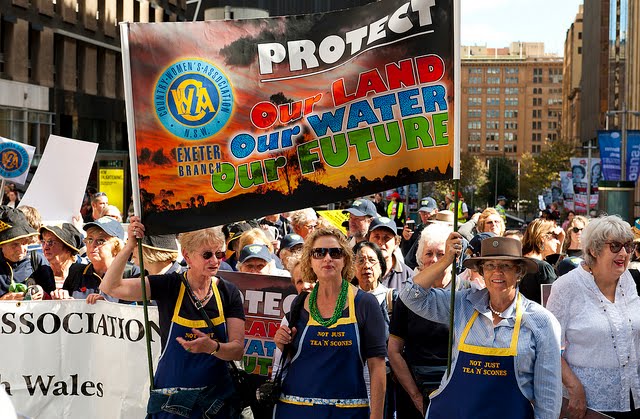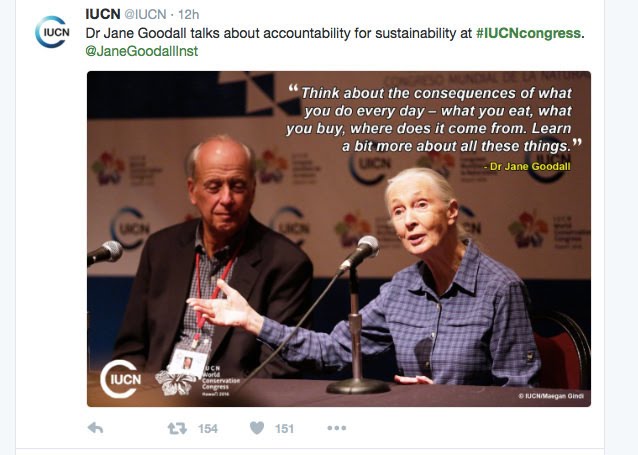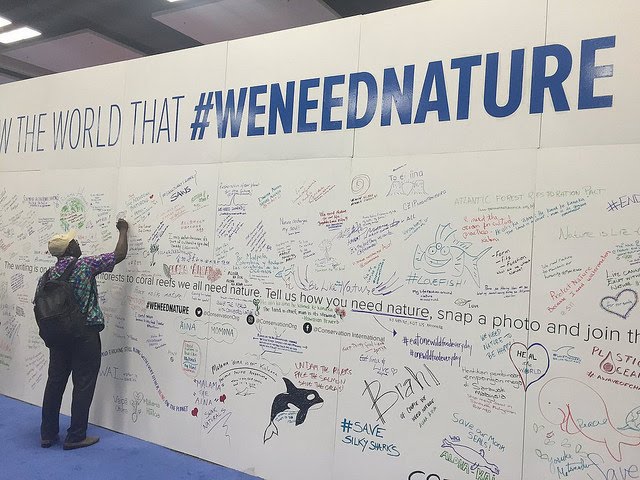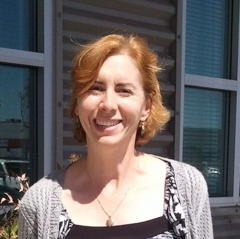Suzanne York is a WEN Board Member and Director of Transition Earth, a project of the Earth Island Institute. This blog was originally posted in the Earth Island Journal.
by Suzanne York
What role can women’s rights, education, and access to heath care play in saving the planet? Can we make lasting conservation gains without addressing these issues? In this month’s blog, WEN Board Member Suzanne York reflects on the International Union for the Conservation of Nature’s World Congress and recommends that the organization address the benefits of linking conservation and gender equality programs.

Photo by MaxPhillips/Jeremy Buckingham MLC
For sustainable conservation, women’s reproductive health and rights need to be guaranteed
The clock is ticking and global environmental problems are mounting, with droughts, biodiversity loss, and acidic oceans and much more taking a toll on the planet.
The International Union for the Conservation of Nature’s World Congress, currently taking place in Hawai’i, is tackling this growing list of threats to the environment. The IUCN is recognized for its Red List of Threatened Species, an “inventory” of the world’s plant and animal species. The latest list was just released, and of the more than 82,000 species assessed by the IUCN, nearly 30 percent are threatened with extinction.
The conference theme is “Planet at the Crossroads.” The question facing the world today is, which direction will humanity choose, business as usual or saving the planet? Fortunately, there are some solutions to more effective conservation that today’s environmentalists are beginning to realize are too important to ignore.
Women at the Center
 One of these solutions is to empower women and girls. Investing in women’s rights will allow women — who bear the larger brunt of environmental degradation and climate change — to deal with the increasingly severe environmental problems affecting communities worldwide.
One of these solutions is to empower women and girls. Investing in women’s rights will allow women — who bear the larger brunt of environmental degradation and climate change — to deal with the increasingly severe environmental problems affecting communities worldwide.
This means ensuring education for women and girls, providing access to healthcare (including voluntary family planning services), recognizing greater land rights, reducing and eradicating gender and economic inequality, ending child marriage, and improving economic opportunities. When women’s needs are met, they are able to better manage resources, confront the effects of climate change and handle climate mitigation and adaptation, and support sustainable communities.
The IUCN Congress will conclude with a series of commitments, or motions, to help devise a conservation agenda for the coming years. Yet despite increasing awareness and commitments on how women’s empowerment benefits nature, women and gender issues are conspicuously absent from the final motions presented in Hawai’i.
“It’s absolutely shocking that none of the IUCN motions include any mention of women and gender,” says A Tianna Scozzaro, conference attendee and director of the Sierra Club’s Global Population and Environment Program, “especially given that gender inequalities, environmental degradation, and climate impacts hit women first and worst.”
Linking Conservation and Health
Another solution is linking conservation and health initiatives. The development model, known as population, health, and environment (PHE), has great potential. The PHE model goes beyond meeting the needs for contraception, reproductive health, and general healthcare. It also incorporates conservation and management of the local environment and empowers people — especially women — who depend on the environment for their livelihoods. There are many successful PHE examples in countries around the world, especially in East Africa.
For example, Conservation Through Public Health runs a PHE program at Uganda’s Bwindi Impenetrable National Park, a place considered to be a biodiversity hotspot that is home to an estimated half of the world’s 880 critically endangered mountain gorillas. The park is surrounded by poor communities with a high rate of population growth.
The nonprofit, which conducts programs to protect gorillas and other wildlife from human and livestock disease risk, has successfully integrated family planning within national park communities by focusing on wildlife health and community health, and by empowering people through information technology. Via a network of community health volunteers, it has promoted better health practices, including family planning, and prevention and control of TB, HIV/AIDS, and dysentery, and has also fostered an attitude of environmental stewardship.
But so much still comes back to women’s rights.
“Gender equality is not just a box to be checked. But it was clear at the IUCN conference that implementation of gender policies is lacking,” says Meaghan Parker, writer/editor with the Woodrow Wilson Center’s Environmental Change and Security Program, and an advocate of the PHE model. “Without empowering women by ensuring their reproductive health and rights, conservation gains will not be truly sustainable.”
Taking Action for People and the Planet
A quick look at social media reflects many voices at the IUCN talking about why we need nature and how to live in harmony with nature. (See hashtags #WeNeedNature, #NatureForAll, and #WildForLife).

Photo by Suzanne York
People cannot exist without nature; we are part of the web of life. Hopefully, when the conference wraps up, these words will be heeded, and some of the next steps have solutions such as women’s rights and PHE front and center.
 Suzanne York is Senior Writer with the Institute for Population Studies in Berkeley, CA. Her work is focused on the interconnectedness of population growth with women’s empowerment, human rights, consumption, alternative economies, and the environment. Suzanne’s writing appears on the blog 6 Degrees of Population. She is the author of several reports, including Peoples’ Rights, Planet’s Rights: Holistic Approaches to a Sustainable Population and Prioritizing the PHE Approach: Linking Population, Health, and Environment for a Better World. As research director with the International Forum on Globalization, she was a contributing author to Paradigm Wars: Indigenous Peoples’ Resistance to Economic Globalization. Suzanne has a Master’s Degree in Public Policy from American University, and has reported on international human rights, globalization, and environmental issues for more than a decade.
Suzanne York is Senior Writer with the Institute for Population Studies in Berkeley, CA. Her work is focused on the interconnectedness of population growth with women’s empowerment, human rights, consumption, alternative economies, and the environment. Suzanne’s writing appears on the blog 6 Degrees of Population. She is the author of several reports, including Peoples’ Rights, Planet’s Rights: Holistic Approaches to a Sustainable Population and Prioritizing the PHE Approach: Linking Population, Health, and Environment for a Better World. As research director with the International Forum on Globalization, she was a contributing author to Paradigm Wars: Indigenous Peoples’ Resistance to Economic Globalization. Suzanne has a Master’s Degree in Public Policy from American University, and has reported on international human rights, globalization, and environmental issues for more than a decade.
